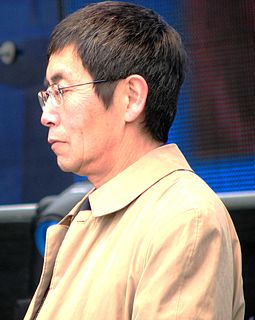A Quote by Bei Dao
I don't think of writing my poems for China or for the world. I mainly think of a small audience of friends and people I know. I am writing for that small group. They are not necessarily going to be able to read it, but that's what I have in mind when I write.
Related Quotes
When I worked on a magazine, I learned that there are many, many writers writing that can't write at all; and they keep on writing all the cliches and bromides and 1890 plots, and poems about Spring and poems about Love, and poems they think are modern because they are done in slang or staccato style, or written with all the 'i's' small.
I don't have an audience in mind when I write. I'm writing mainly for myself. After a long devotion to playwriting I have a good inner ear. I know pretty well how a thing is going to sound on the stage, and how it will play. I write to satisfy this inner ear and its perceptions. That's the audience I write for.
There is a huge tension in trying to write with small children because they demand your attention and your time with a fierceness that can be matched by nothing else, but if you are successful in writing while you have small children, I actually think that your writing is likely to be deeper than it was before.
I am fully intelligent only when I write. I have a certain amount of small-change intelligence, which I carry round with me as, at any rate in a town, one has to carry small money, for the needs of the day, the non-writing day. But it seems to me I seldom purely think ... if I thought more I might write less.
I think all writing is about writing. All writing is a way of going out and exploring the world, of examining the way we live, and therefore any words you put down on the page about life will, at some level, also be words about words. It's still amazing, though, how many poems can be read as being analogous to the act of writing a poem. "Go to hell, go into detail, go for the throat" is certainly about writing, but it's also hopefully about a way of living.
I don't think we need a critic to negotiate with the audience. People say, "Who are you writing for?" I'm writing for myself but my audience is anybody who knows how to read. I think a story should engage anybody who knows how to read. And I hope that my stories do, maybe on a different level for more sophisticated readers than, say, a high school kid, but still a story has got to grab you. That's why we read it.
Objectifying your own novel while writing it never really helps. Instead, I guess while you're writing you need to think: This is the novel I want to write. And when you're done you need to think: This is what the novel I wanted to write feels like and reads like and looks like. Other people might call it sweeping or small, but it's the book you chose.
I do think they [French] view my writing itself as exotic - though that's probably not the best term for it - to a small extent, mainly because I say things that most French writers would probably hesitate to say for fear of offending someone or upsetting public sensibilities. I don't think that answers the question, but I'm not much good at figuring readers out or I would probably be writing bestsellers.
There was no real strategic decision about editorial tone. It was kind of a write whatever you want to write, and we'll see how it goes. I think that we lucked out in that all of the women who started writing at Feministing.com were really funny, and I don't think that's something people are used to seeing or hearing when they read feminism. You know, you think feminism and you kind of think academic, women's studies, dry, humorless; there are all of these stereotypes that go along with what feminist thought is and what feminist writing is.







































